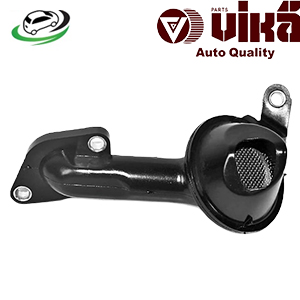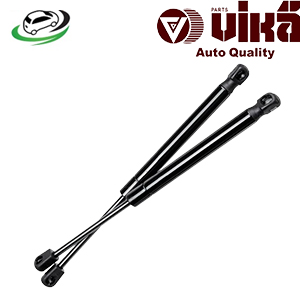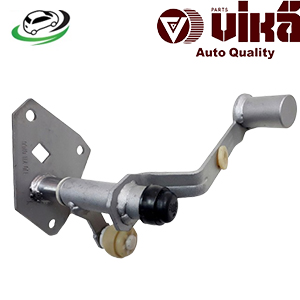-4%
Get VW Golf MK4/ Bora / AUDI A3 Gear Selector Linkage Relay Lever 1J0711076G
The gear selector linkage relay lever is an integral part of a vehicle’s transmission system. It connects the driver’s gear shift to the transmission, facilitating smooth and precise gear changes. This component is especially important in manual transmissions but is also present in various forms in automatic transmission vehicles. In this detailed guide, we’ll explore the function of the gear selector linkage relay lever, its benefits, common issues, and maintenance tips to ensure the smooth operation of your vehicle’s transmission.
What is the Gear Selector Linkage Relay Lever?
The gear selector linkage relay lever is a component within the transmission system that connects the gear shift mechanism (often located inside the cabin) to the transmission assembly. This lever, usually made of metal or a composite material, works alongside other components like the gear shift cables, bushings, and rods to transfer the driver’s input from the gear stick to the transmission.
The relay lever acts as a mechanical intermediary between the driver’s commands and the transmission’s engagement of gears. In essence, it ensures that when the driver selects a gear, the correct gear is engaged in the transmission, allowing the vehicle to move forward, backward, or remain in neutral.
Function of the Gear Selector Linkage Relay Lever
The primary function of the gear selector linkage relay lever is to enable precise gear shifting by translating the driver’s gear selection input into movement within the transmission. Here’s a breakdown of its main functions:
- Transferring Driver Input:
When the driver moves the gear shift lever, the gear selector linkage relay lever transfers this motion to the transmission. It operates as part of a complex linkage system, ensuring that the correct gear is selected based on the position of the gear shift lever. - Maintaining Precision in Gear Selection:
In manual transmissions, precision is essential to avoid incorrect gear engagement, which can damage the transmission or hinder driving performance. The gear selector linkage relay lever ensures that each gear is engaged correctly without ambiguity. - Stabilizing the Gear Shifting Process:
The relay lever helps to stabilize the gear shifting process, reducing the amount of force needed to change gears. It acts as a pivot point in the linkage system, allowing smooth, fluid movements that make gear changes easier for the driver. - Facilitating Smooth Gear Changes:
The gear selector linkage relay lever ensures that gear changes are smooth and efficient by minimizing resistance between the gear stick and transmission. Without it, the driver would have to exert more force to shift gears, leading to clunky or stiff gear changes.
Types of Gear Selector Linkage Systems
- Rod Linkage:
In older and simpler transmission systems, the gear selector linkage uses rigid rods to transfer movement from the gear stick to the transmission. The gear selector linkage relay lever in these systems helps direct the motion of these rods, enabling the correct gear selection. - Cable Linkage:
In modern vehicles, the gear selector linkage system often uses cables. These cables are flexible and allow for more precise movement between the gear stick and the transmission. The relay lever works with these cables to ensure that the correct gear is selected with minimal resistance. - Electronic Linkage:
Some advanced vehicles use electronic or semi-electronic gear selector systems. In these systems, the gear selector linkage relay lever might still be present but is aided by electronic sensors and actuators to select gears automatically or semi-automatically.
Benefits of a Properly Functioning Gear Selector Linkage Relay Lever
- Smooth Gear Shifting:
A well-maintained gear selector linkage relay lever ensures smooth and easy gear changes. This enhances the driving experience by reducing the amount of force required to shift gears and improving the overall responsiveness of the transmission. - Improved Driving Comfort:
Smooth gear changes contribute to a more comfortable driving experience. Jerky or stiff gear changes can make driving stressful, especially in stop-and-go traffic. A properly functioning relay lever ensures fluid transitions between gears. - Reduced Transmission Wear:
When the relay lever is functioning correctly, it helps prevent unnecessary wear on the transmission components. Gear grinding or improper gear engagement, which can occur due to a faulty linkage, can lead to premature transmission wear or failure. - Increased Transmission Efficiency:
The relay lever plays a crucial role in ensuring that the transmission engages the correct gear quickly and efficiently. This reduces the strain on the engine and transmission, improving overall vehicle performance and fuel efficiency. - Enhanced Gear Selection Accuracy:
Precise gear selection is vital for the health of the transmission system. A properly functioning relay lever ensures that the driver can easily select the correct gear without hesitation or misalignment, reducing the risk of gear slips or disengagements.
Common Issues with the Gear Selector Linkage Relay Lever
- Wear and Tear:
Over time, the metal or composite materials that make up the relay lever can wear down due to constant use. This wear can result in loose or imprecise gear shifting, which can compromise the overall performance of the vehicle’s transmission. - Broken or Damaged Components:
In some cases, the gear selector linkage relay lever may break or become damaged due to physical stress or impact, such as during an accident or off-road driving. A damaged lever can result in difficulty shifting gears, or in severe cases, complete gear shift failure. - Bushing Deterioration:
The gear selector linkage relay lever often works in conjunction with bushings that help reduce friction between moving parts. These bushings are usually made of rubber or other pliable materials and can wear out over time, leading to increased friction, noise, and imprecise gear changes. - Cable or Rod Misalignment:
In cable or rod-based linkage systems, the relay lever can become misaligned, either due to damage, wear, or improper installation. Misalignment can result in the driver selecting the wrong gear or difficulty shifting gears altogether. - Corrosion or Rust:
If the gear selector linkage relay lever is exposed to moisture, dirt, or road salt, it can become corroded. Rust or corrosion can affect the movement of the relay lever, leading to stiffness or restricted gear movement.
Maintenance Tips for Gear Selector Linkage Relay Lever
- Regular Lubrication:
Keeping the gear selector linkage system properly lubricated is essential for smooth operation. Use the recommended lubricant to ensure that the moving parts of the linkage, including the relay lever, move freely and without friction. - Inspect for Wear and Damage:
Periodically inspect the gear selector linkage relay lever and associated components, such as bushings and cables, for signs of wear, damage, or corrosion. Catching these issues early can prevent more significant transmission problems down the line. - Replace Worn Bushings:
If the bushings in the linkage system have worn out, replace them promptly. Worn bushings can cause excessive play in the gear shift mechanism, making it difficult to select gears accurately. - Check for Alignment Issues:
If you experience difficulty shifting gears, it may be due to misalignment in the linkage system. Have a professional check the alignment of the gear selector linkage relay lever and associated cables or rods to ensure proper functioning. - Protect Against Corrosion:
Protect the gear selector linkage relay lever from corrosion by applying rust-resistant coatings, especially if you live in an area where road salt or moisture is common. Rust can severely impede the movement of the relay lever, leading to transmission issues. - Seek Professional Servicing:
If you encounter any issues with the gear selector linkage system or notice symptoms like stiff gear shifts or misaligned gears, seek professional help. A qualified mechanic can diagnose the problem and suggest appropriate repairs or replacements.
Common Symptoms of a Failing Gear Selector Linkage Relay Lever
- Difficulty Shifting Gears:
One of the most common signs of a failing relay lever is difficulty shifting gears. This can manifest as stiffness in the gear shift lever or the inability to engage certain gears. - Gear Slippage:
A malfunctioning gear selector linkage relay lever can cause the vehicle to slip out of gear or not stay engaged in the selected gear. This can be dangerous while driving and should be addressed immediately. - Inaccurate Gear Selection:
If you notice that the gear stick is in one position but the transmission seems to be in a different gear, it may be due to misalignment or wear in the gear selector linkage relay lever. - Noise During Gear Changes:
Unusual noises such as clunking or grinding during gear changes can be indicative of a problem with the relay lever or related components. This noise could be caused by worn bushings or misaligned linkage parts.
Conclusion
The gear selector linkage relay lever is a crucial component that ensures smooth, precise gear changes by transferring the driver’s input to the transmission. Proper maintenance of this component is essential for optimal vehicle performance, efficient transmission operation, and enhanced driving comfort. By understanding its function, recognizing the symptoms of wear, and maintaining the linkage system regularly, you can extend the lifespan of your transmission and enjoy a smooth driving experience.
Follow us on Facebook for more parts.






Reviews
Clear filtersThere are no reviews yet.